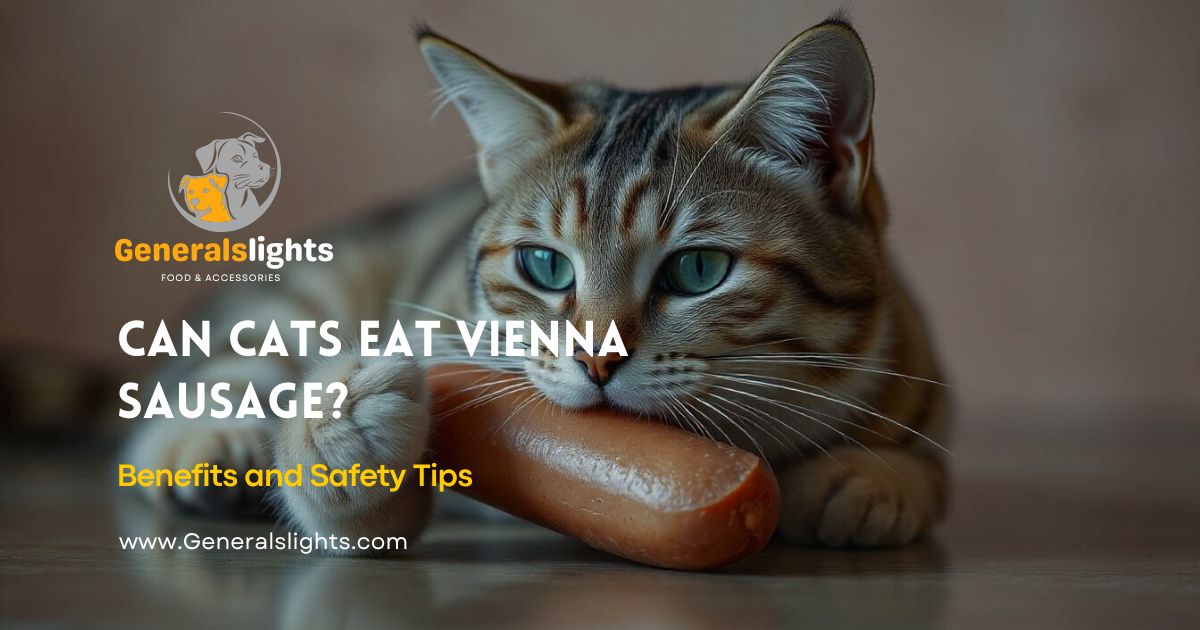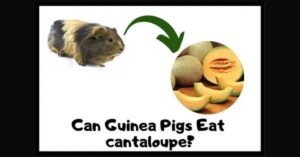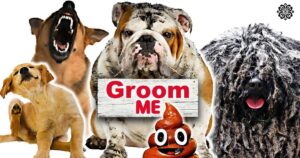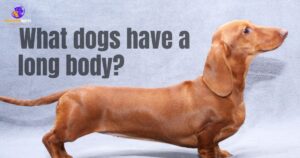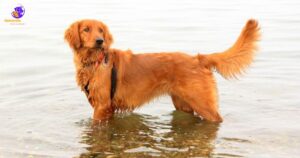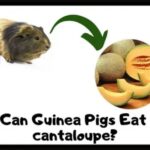Feeding cats human food like Vienna sausages might seem harmless, but it poses significant risks. This article explores whether Vienna sausages are safe for cats, highlighting the potential dangers and nutritional concerns. Understanding these risks is crucial for keeping your feline friend healthy and avoiding harmful dietary choices.
Imagine your cat eyeing a Vienna sausage with curiosity. While it might be tempting to share, have you considered the hidden dangers? Processed meats like Vienna sausages contain ingredients that could harm your cat’s health. Before you give in to those pleading eyes, learn why it’s best to think twice. Can Cats Eat Vienna Sausage?
Vienna sausages are highly processed and contain excessive sodium, unhealthy fats, and preservatives like sodium nitrate. These ingredients can lead to dehydration, obesity, and even kidney issues in cats. While a small taste may not cause immediate harm, regular consumption can have serious long-term health consequences for your feline friend.
What Are Vienna Sausages?
Vienna sausages are small, pre-cooked sausages typically made from a mix of meats like pork, beef, or chicken. They’re seasoned with various spices and preservatives and then packaged in cans or jars.
Originating from Europe, these sausages are soft and often eaten as a snack or in meals. However, their high sodium, fat content, and artificial additives make them an unhealthy choice, especially for pets like cats.
Types and Varieties
Canned Vienna Sausages: These are the most common variety, typically stored in brine or broth, making them convenient but high in sodium.
Smoked or Flavored Vienna Sausages: These sausages come with additional flavours like BBQ, garlic, or smoke, which can include extra additives and spices.
Low-Sodium or Health-Conscious Varieties: Some brands offer reduced-sodium versions, but they still contain preservatives and are not ideal for pets.
The Feline Digestive System
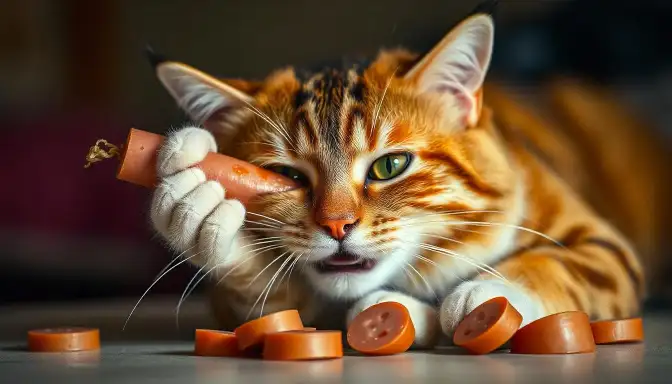
Cats have a short, simple digestive tract suited for high-protein diets. They lack the enzymes to break down complex carbohydrates and process fats differently than humans. Their system is optimized for meat, making processed foods like Vienna sausages potentially harmful.
How Cats Process Food
Cats process food through a short, efficient digestive tract designed for high-protein diets. Their stomachs quickly break down proteins and fats, but they struggle with carbohydrates and artificial additives. This makes them sensitive to processed foods and unsuitable ingredients.
Differences in Human Digestion
Humans have a longer digestive tract with complex enzymes for breaking down carbohydrates, proteins, and fats. Unlike cats, humans can handle a variety of foods and additives. Cats, however, are specialized for protein digestion and may struggle with processed ingredients.
Nutritional Analysis of Vienna Sausages
Vienna sausages are high in sodium, unhealthy fats, and preservatives. They offer minimal nutritional benefits, with low-quality protein and no essential cat nutrients. Their excessive salt and additives can lead to health issues like obesity and kidney problems.
Macronutrient Content
Vienna sausages typically contain high levels of fat and sodium, with moderate protein. The fat content is often unhealthy, contributing to obesity, while the high sodium can lead to dehydration and hypertension, posing risks for cats.
Micronutrient Content
Vienna sausages generally contain minimal vitamins and minerals, often lacking essential nutrients for a balanced diet. The presence of preservatives and additives can further detract from their nutritional value, making them unsuitable for providing any significant health benefits to cats.
Additives and Preservatives
Vienna sausages often contain additives like sodium nitrate and preservatives to enhance shelf life and flavour. These substances can be harmful to cats, potentially causing digestive issues, kidney problems, and other health complications due to their toxic effects and high sodium content.
Potential Health Risks for Cats
The potential health risks for cats such as high sodium content, high-fat content, artificial additives and preservatives, and risk of gastrointestinal upset are all described as follows;
High Sodium Content
Vienna sausages are high in sodium, which can lead to dehydration, hypertension, and kidney damage in cats. Excessive sodium disrupts fluid balance and can strain the cardiovascular system, making it unsuitable for feline consumption.
High-Fat Content
Vienna sausages have a high fat content, which can contribute to obesity and pancreatitis in cats. Unhealthy fats increase the risk of weight gain and related health issues, such as diabetes and heart disease, making them poor dietary choices.
Artificial Additives and Preservatives
Vienna sausages often contain artificial additives and preservatives like sodium nitrate. These chemicals can cause adverse reactions in cats, including allergic responses and digestive disturbances. Over time, they may contribute to more severe health issues such as liver damage.
Risk of Gastrointestinal Upset
Vienna sausages can cause gastrointestinal upset in cats, including symptoms like vomiting, diarrhoea, and abdominal pain. The high fat and sodium content, along with artificial additives, can irritate a cat’s digestive system, leading to discomfort and digestive issues.
Behavioural Impact of Feeding Vienna Sausages
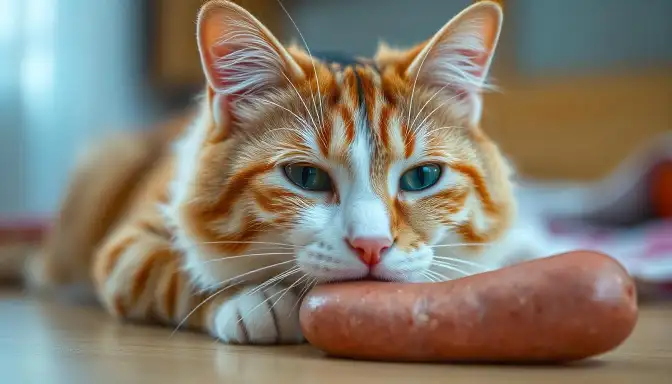
Feeding Vienna sausages can lead to behavioural issues in cats, such as increased begging or food obsession due to the high fat and sodium content. This can disrupt normal eating habits and lead to unhealthy weight gain and dependency on unhealthy treats.
Encouraging Picky Eating Habits
Offering Vienna sausages can encourage picky eating habits in cats, as they may develop a preference for high-fat, flavorful treats over balanced meals. This behaviour can make it challenging to maintain a nutritious diet and lead to long-term health issues.
Potential for Food Obsession
Vienna sausages’ strong flavour and high-fat content can lead to cat food obsession. This obsession can cause them to constantly seek out these treats, potentially leading to an imbalance in their diet and unhealthy eating patterns.
Disrupting a Balanced Diet
Feeding Vienna sausages can disrupt a cat’s balanced diet by introducing excessive fat, sodium, and additives. This imbalance can lead to nutritional deficiencies, weight gain, and overall poor health, making it harder to maintain a healthy, well-rounded diet.
Alternatives to Vienna Sausages
Healthier alternatives to Vienna sausages include lean meats like cooked chicken or turkey, and commercial cat treats specifically formulated for feline nutrition. Homemade cat treats made with safe ingredients also provide a better, more balanced option for rewarding your cat.
Healthy Meat Options
Healthy meat options for cats include cooked chicken, turkey, and fish, which offer high-quality protein without harmful additives. These meats are easier for cats to digest and support their overall health, unlike processed meats like Vienna sausages.
Commercial Cat Treats
Commercial cat treats designed for feline health provide balanced nutrition and are formulated to meet cats’ dietary needs. They often contain essential vitamins, minerals, and proteins, making them a safer and healthier choice compared to processed meats like Vienna sausages.
Homemade Treat Recipes
Homemade cat treats, such as baked chicken bites or tuna flakes, offer a nutritious alternative to processed snacks. Using simple, cat-friendly ingredients ensures treats are free from harmful additives and tailored to your feline’s dietary needs.
Real-Life Examples
Instances of Cats Suffering from Inappropriate Diets
- Obesity in a Domestic Cat: A cat fed high-fat treats develops severe obesity, leading to diabetes and mobility issues.
- Pancreatitis Case: A cat with frequent access to processed meats suffered acute pancreatitis, requiring emergency veterinary care.
- Kidney Disease Development: Excessive sodium in the diet of an elderly cat contributed to chronic kidney disease, impacting overall health and longevity.
Veterinary Reports on Processed Food Consumption
- Sodium Impact: Reports show that high sodium in processed foods contributes to hypertension and kidney damage in cats.
- Digestive Disturbances: Studies link processed meats to increased gastrointestinal issues, including vomiting and diarrhoea in felines.
- Long-Term Health Effects: Veterinarians note that chronic consumption of processed foods accelerates obesity and related conditions in cats.
Expert Opinions
Veterinary Insights on Processed Meats
Veterinary insights reveal that processed meats, like Vienna sausages, are harmful to cats due to high sodium, fat, and artificial additives. These ingredients can lead to obesity, kidney issues, and gastrointestinal problems, underscoring the need for a balanced, species-appropriate diet.
Nutritionist Recommendations
Nutritionists recommend feeding cats a balanced diet rich in high-quality proteins and low in additives. They advise avoiding processed meats like Vienna sausages due to their high sodium and fat content, which can lead to long-term health issues in cats.
Addressing Common Misconceptions
A Little Won’t Hurt: Even small amounts of processed meats can disrupt a cat’s diet and lead to health issues over time.
Cats Can Eat What We Eat: Cats have specific dietary needs and cannot safely consume many human foods, especially processed ones.
If They Like It, It’s Fine: Preference for certain foods doesn’t mean they are nutritionally suitable or safe for cats.
Processed Foods Are Safe in Moderation: Processed meats contain harmful additives and excessive sodium, making them unsafe even in small quantities.
Homemade Treats Aren’t a Concern: Homemade treats need to be made with careful consideration of feline nutritional needs to avoid similar health risks.
Practical Tips for Cat Owners
Provide a Balanced Diet: Ensure your cat’s diet consists of high-quality cat food formulated to meet their specific nutritional needs, avoiding processed meats and human food.
Monitor Treats: Limit treats to those specifically designed for cats, and avoid giving human food or high-fat, high-sodium snacks like Vienna sausages.
Read Labels Carefully: When selecting commercial cat treats, check ingredient lists to ensure they contain beneficial nutrients and avoid harmful additives.
Introduce New Foods Gradually: When adding new foods or treats, do so slowly to monitor for any adverse reactions or digestive issues.
Consult Your Vet: Regularly discuss your cat’s diet with your veterinarian to ensure they receive appropriate nutrition and address any concerns about their health or diet.
What to Do in Case of Accidental Ingestion
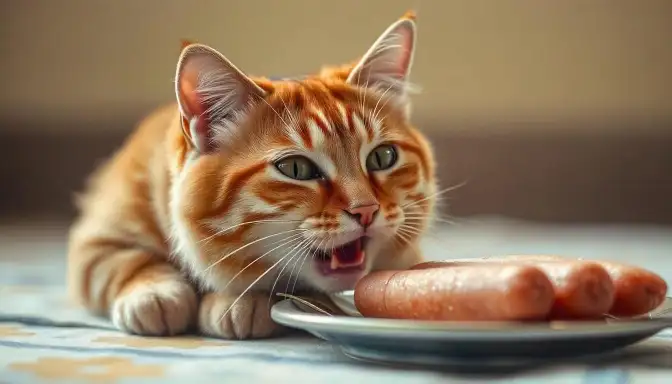
Immediate Steps
If your cat consumes Vienna sausages, monitor for symptoms like vomiting, diarrhoea, or lethargy. Offer plenty of fresh water to help flush out excess sodium. Contact your veterinarian promptly to discuss the situation and get advice on whether any further action or treatment is needed.
Symptoms to Watch For
Watch for symptoms such as vomiting, diarrhoea, excessive thirst, lethargy, and abdominal pain. These signs may indicate gastrointestinal upset or more serious health issues resulting from the ingestion of Vienna sausages. If any symptoms occur, contact your veterinarian for evaluation and guidance.
When to Seek Veterinary Help
Seek veterinary help if your cat shows severe symptoms like persistent vomiting, diarrhoea, or signs of dehydration such as excessive thirst or lethargy. Immediate consultation is crucial if symptoms worsen or if your cat ingests a large amount of Vienna sausages or other harmful substances.
Creating a Safe Feeding Environment
To create a safe feeding environment for your cat, keep human foods and unsafe treats out of reach. Offer a balanced diet with high-quality cat food and safe, nutritious treats. Avoid feeding table scraps or processed meats like Vienna sausages.
Establish regular feeding times and use appropriate food and water bowls to encourage healthy eating habits. Regularly clean feeding areas to prevent contamination and consult your veterinarian for personalized dietary advice to ensure your cat’s health and well-being.
Long-Term Implications of Poor Diet Choices
Poor diet choices, like feeding processed meats, can lead to long-term health issues in cats, such as obesity, diabetes, kidney disease, and heart problems. These conditions can significantly reduce their quality of life and lifespan, making balanced nutrition essential.
Chronic Health Conditions
Chronic health conditions from poor diets, such as processed meats, include obesity, diabetes, kidney disease, and heart disease. These conditions require ongoing veterinary management and can severely impact a cat’s overall health, quality of life, and longevity.
Impact on Life Expectancy
Poor diet choices, like feeding processed meats, can shorten a cat’s life expectancy by contributing to chronic health issues such as obesity and kidney disease. Maintaining a balanced, nutritious diet helps ensure better health and a longer, healthier life for your cat.
Cultural and Regional Perspectives
Cultural and regional perspectives on feeding cats vary widely, with some cultures using raw meats or homemade diets, while others rely on commercial cat food. These practices reflect local traditions, beliefs, and available resources, emphasizing the importance of adapting diets to ensure feline health.
Feeding Practices Around the World
Feeding practices for cats vary globally, with some cultures offering a diet of raw meats or fish, while others use commercial cat food. Regional traditions and available resources influence these practices, but a balanced diet remains crucial for feline health.
Regional Variations in Vienna Sausages
Regional variations in Vienna sausages include differences in ingredients, such as additional spices or flavourings, and preparation methods. While traditional Vienna sausages are typically mild, some regions offer spicier or more heavily seasoned versions, impacting their nutritional content.
Environmental and Ethical Considerations
| Aspect | Details |
| Environmental Impact | Processed meats, including Vienna sausages, contribute to environmental issues through factory farming, resource use, and waste. These practices have a larger carbon footprint compared to sustainably sourced or plant-based options. |
| Ethical Considerations | Factory-farmed meats often involve animal welfare concerns, such as overcrowding and poor living conditions. Choosing ethically sourced or homemade cat food can help reduce these issues and promote better treatment of animals. |
Historical Evolution of Cat Diets
Wild vs. Domestic Diets
| Aspect | Wild Diet | Domestic Diet |
| Primary Food | High-protein prey like small mammals, birds, and insects | Commercial cat food, which includes a mix of proteins, carbohydrates, and fats |
| Nutritional Content | Naturally balanced with essential nutrients and moisture | Formulated to meet nutritional needs but may vary in quality and balance |
| Digestive System | Naturally balanced with essential nutrients and moisture | Designed for processed, nutrient-balanced diets, which may include fillers and additives |
| Diet Variety | Seasonal and varied, reflecting prey availability | Often uniform, based on available commercial diets |
| Health Implications | Generally maintains natural health and fitness levels | Lead to health issues if the diet is not well-balanced or contains harmful ingredients |
Historical Feeding Practices
Historically, cats were fed scraps from human meals or hunted for their food, reflecting a diet based on available resources. With the advent of commercial cat food in the 20th century, feeding practices evolved to include formulated diets designed for balanced nutrition and convenience.
Psychological Impact of Diet on Cats
Diet and Behavior
A cat’s diet can significantly influence its behaviour. High-fat or sugary foods may lead to hyperactivity or food obsession, while a balanced diet promotes stable energy levels and positive behaviour. Nutrient deficiencies can also cause irritability or lethargy, affecting overall mood and activity.
Food Addiction in Cats
Food addiction in cats can develop from high-fat or highly palatable treats, leading to obsessive begging and overeating. This addiction can disrupt normal eating patterns, cause obesity, and result in behavioural issues. Managing a diet and offering controlled, nutritious treats can help prevent and address food addiction.
DIY vs. Commercial Cat Food
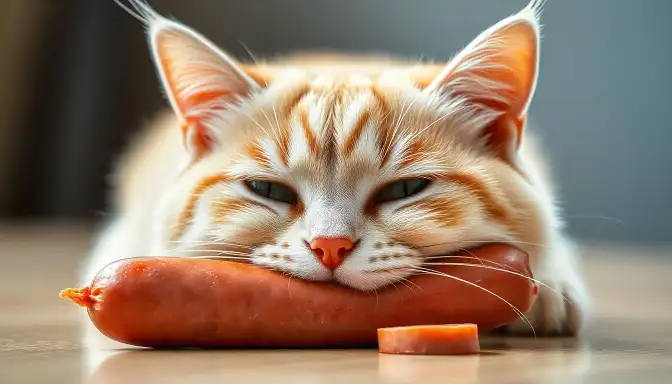
DIY Cat Food: Homemade cat food allows for control over ingredients and can be tailored to meet your cat’s specific dietary needs, avoiding harmful additives. However, it requires a careful balance of nutrients to ensure it’s complete and safe.
Commercial Cat Food: Formulated to provide balanced nutrition with essential vitamins and minerals, commercial cat food is convenient and rigorously tested for safety. Quality varies, so choosing high-quality brands is crucial to avoid fillers and additives that can harm your cat’s health.
Pros and Cons of Homemade Cat Food
Pros:
- Control Over Ingredients: You can choose high-quality, fresh ingredients and avoid harmful additives.
- Customization: Tailor recipes to meet your cat’s specific health needs or dietary restrictions.
- No Fillers: Avoid unnecessary fillers, preservatives, and artificial additives commonly found in commercial foods.
Cons:
- Nutritional Balance: Requires careful planning to ensure all essential nutrients are included, which can be complex and time-consuming.
- Risk of Deficiencies: Only complete or properly balanced diets can lead to nutritional deficiencies or imbalances.
- Preparation Time: Preparing homemade meals involves significant time and effort, including sourcing and cooking ingredients.
Transitioning Cats to Healthier Diets
To transition your cat to a healthier diet, gradually introduce the new food. Mix small amounts of the new diet with the current food, increasing the proportion over 7-10 days. Monitor your cat’s response, including digestion and appetite.
Avoid abrupt changes, which can cause gastrointestinal upset. Offer a variety of approved treats and ensure the new diet meets all nutritional needs. Consult your veterinarian for personalised advice and to address any concerns during the transition process.
Common Cat Food Allergies and Sensitivities
Common cat food allergies and sensitivities include reactions to proteins like beef, chicken, or fish, which can cause symptoms such as itching, vomiting, or diarrhoea. Cats may also be sensitive to grains or artificial additives, leading to gastrointestinal issues or skin problems.
Identifying and avoiding these allergens often requires an elimination diet and veterinary guidance. Using limited-ingredient or hypoallergenic cat foods can help manage and prevent adverse reactions. Always consult your vet if you suspect food allergies.
Vienna Sausages vs. Healthy Cat Treats
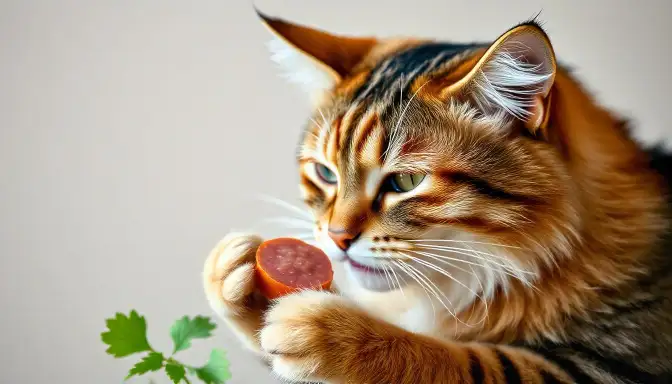
Vienna sausages are high in sodium, fat, and artificial additives, making them unsuitable for cats and potentially harmful to their health. In contrast, healthy cat treats are specifically formulated to provide balanced nutrition with essential vitamins and minerals, supporting overall well-being.
They typically avoid harmful ingredients and are designed to be easily digestible. Choosing high-quality cat treats over processed meats ensures better health outcomes, preventing issues such as obesity, kidney disease, and digestive problems.
FAQs
Can cats eat Vienna sausages?
No, they are unhealthy due to high sodium and fat.
What are the risks of feeding Vienna sausages to cats?
Obesity, kidney damage, and digestive issues.
What should I do if my cat eats Vienna sausages?
Monitor for symptoms and contact your vet if needed.
What are healthier alternatives for cats?
Cooked chicken, commercial cat treats, or homemade treats.
How can I transition my cat to a healthier diet?
Gradually mix the new food with their current diet and consult your vet.
Conclusion
Vienna sausages are unsuitable for cats due to their harmful sodium, fat, and additive content. Opting for balanced, nutritious alternatives, such as high-quality cat food or healthy treats, supports feline health and well-being. Always consult your veterinarian for guidance on maintaining a proper diet for your cat.
Read More :

Emerson is an expert in the world of pets, specializing in understanding diverse breeds, nutrition, and health. His deep knowledge ensures your pets receive the best care, from balanced diets to top-notch health advice, keeping them at their happiest and healthiest.
